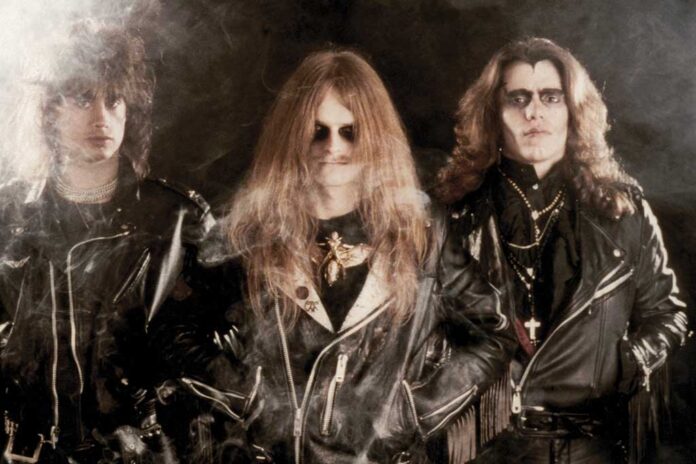
Photograph by Sergio Archetti
INTERVIEW WITH TOM G. WARRIOR BY GEORGE PACHECO
CELTIC FROST WAS A ONE OF A KIND BAND. The formative first wave black metal artists experimented, broke boundaries, and influenced generations of heavy groups in their wake. There’s been no shortage of Celtic Frost and Hellhammer reissues over the years, either, so thankfully, the Danse Macabre set is a carefully curated and thoroughly packaged collection, complete with cult rehearsal tracks that sound as fresh now as they did back in the 80s. We checked in with Tom G. Warrior to discuss not only Danse Macabre, but also the history and passionate discussion both Celtic Frost and Hellhammer evoke for metalheads today.
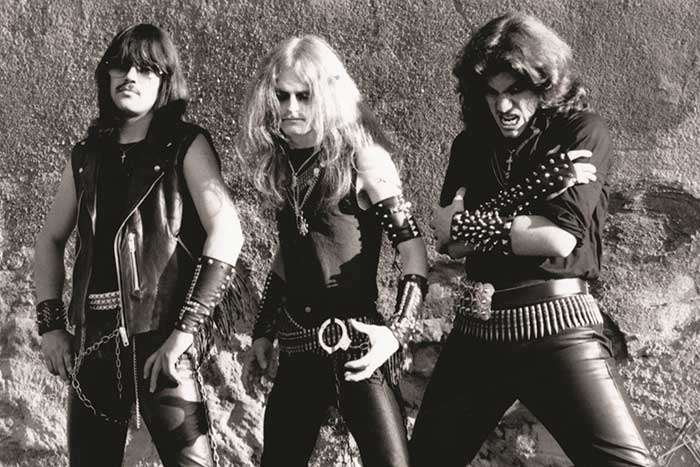
How closely were you involved with the nuts ’n’ bolts of putting the Danse Macabre collection together?
Martin Eric Ain and I don’t have any rights to the Celtic Frost music. Those rights were taken away by Noise Music in the 80s and now are with BMG. The idea for this box set came from BMG. It has nothing to do with me. I was involved on the artistic side, however, because BMG is actually a very professional operation and they’re totally interested in artist suggestions. Even though they have the rights to it, they contacted me and wanted me to be involved. So, I became the art director and was involved with the whole concept. I had a lot of input, but I don’t receive any royalties, nor do I have the rights. I’m very glad that they involved me on the creative side.
“I WOULD LIKE TO HAVE THE RIGHTS TO MY EARLY MUSIC, BECAUSE IT’S ONE OF, IF NOT THE MOST IMPORTANT PERIOD OF MY LIFE.”
Now that you mention it, there were those Noise LP reissues a number of years ago for Vanity/Nemesis and the like. Is that frustrating to you?
Those reissues from 2017 were actually still through BMG, and they asked me then to be involved as well. They didn’t have to do that. They could’ve just reissued them any which way they pleased. Martin was still alive then, and they contacted the both of us to be involved. I think this applies for any band signed to Noise Records in the 80s. We all gave the rights without knowing to Noise Records—that was their modus operandi at the time. So, we are very lucky that those rights are now with BMG, a company that actually cares for the musicians and not just for the money. But yes, it is frustrating. Of course, I would like to have the rights to my early music, because it’s one of, if not the most important period of my life. At least the rights are with BMG, because they’re professional and pleasant. I’m deeply grateful to them.
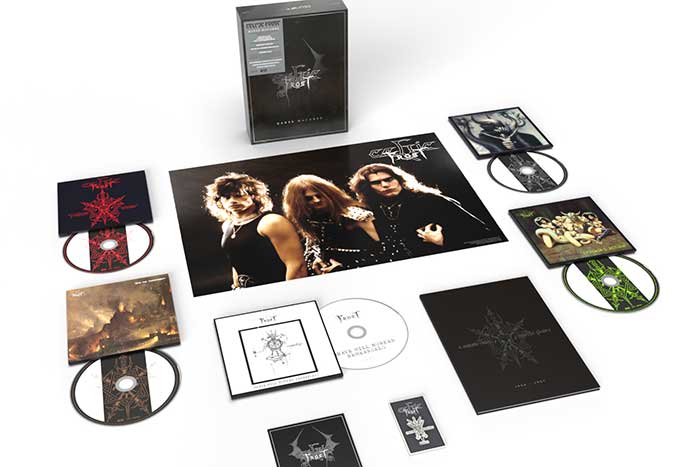
The Danse Macabre package looks and sounds great. Rehearsal tapes of this age shouldn’t sound this good.
Nobody’s more surprised with how those rehearsals sound than me! We used to record a lot of rehearsals, actually, but nobody knew that Celtic Frost would go anywhere. Nobody knew that it would be important one day. We gave these tapes away to our friends, we gave them to our crew, we even recorded over them! We only recorded rehearsals to take home and write lyrics, or practice harmony guitars—stuff like that. So, the only rehearsal to survive, that I know of, was this one cassette from which this collection is sourced. And we’re really lucky that, with a little remastering, they sound so fresh. It’s almost like standing next to the band. It’s amazing!
“WE’RE DEEPLY GRATEFUL THAT THE AUDIENCE GAVE US THIS LIFE AND GAVE OUR MUSIC A CHANCE.”
There’s still such a hungry demand for anything Celtic Frost. Do you think that speaks to how much your work has impacted people?
I guess, it does, but it’s not something Martin or I could’ve predicted. We’re deeply grateful that the audience gave us this life and gave our music a chance. There used to be a time when people laughed at Hellhammer and Celtic Frost. Really, nobody wanted to give us a chance. Then, out of the blue, one by one we built an audience, and people actually gave our music a chance. The name and music of Celtic Frost still being around is not something I take for granted. It makes me deeply grateful, and I owe everything in my musical life to my audience.
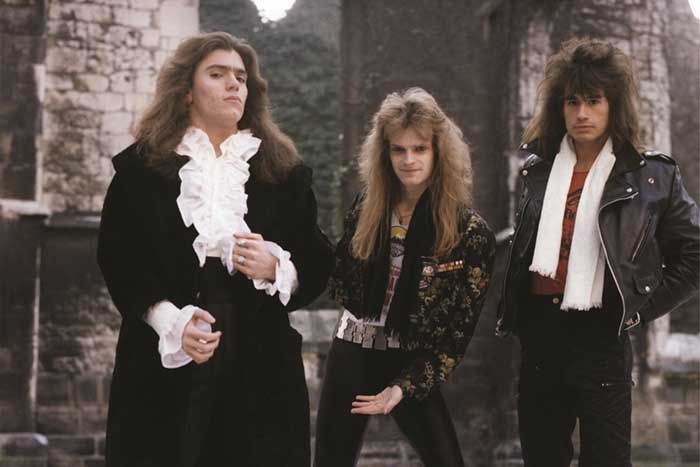
You’re even playing Hellhammer sets in the modern era, but that band has always seemed to be a source of conflict for you. How does it feel to play it now?
Having been a member of Hellhammer and having created some of the material proved to be problematic for a number of members, including Martin and I. It’s quite complex, because as a fan, you can approach Hellhammer from the outside and enjoy the music. For us, not only was it an extremely difficult time, with some of those songs reflecting that, but it was also this millstone around our neck after we formed Celtic Frost. In the early days, right on through to the second album, people would call us “those guys from Hellhammer, they’re not professional, they can’t play.” It wasn’t the myth that it is now.We really began to hate Hellhammer for being a barrier in front of the path we wanted to pursue. We really struggled, that’s absolutely true. There were times that we completely shunned it. I wish, at the time, that I could’ve approached it from the outside, like many of our fans. That only became possible when Martin and I reformed Celtic Frost. We spent many nights talking about our history and all of that included Hellhammer.
Do you feel that yourself, Martin, and Reed [St. Mark] to be the definitive Celtic Frost lineup?
Absolutely. I’ve always felt like that. Even though I left Celtic Frost in 2008, Martin and I remained friends and saw each other regularly. And I would describe Reed as still one of my closest friends, and all of this is because of the time we spent together, what we created together, and all of the adventures. For all of us, it was an absolute magical period of our lives, and we owe this to each other.
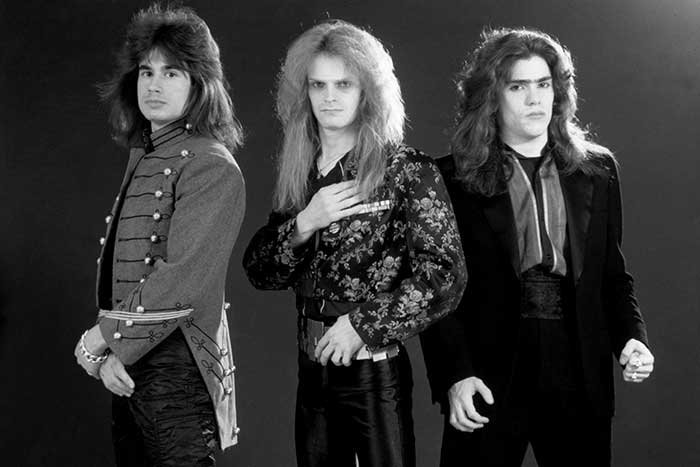
You’ve had a number of people come through and offer their talents to different Celtic Frost records. What do you feel the other members, like Stephen [Priestly], Oliver [Amberg],or Dominic [Steiner], brought to the band over the course of your career?
They had importance at certain different points, but if I’m really honest, the Celtic Frost that defined Celtic Frost was Martin, Reed, and I. Steve Priestly was the only drummer we could get at the time, and we knew it was far from an ideal choice. He really wasn’t professional and didn’t like the music, but it was extremely difficult to find an extreme metal drummer in 1984. There was no scene for this, and we had to make do with what we had.Dominic Steiner, we owe to him that we could record the second album, To Mega Therion, because Martin couldn’t do it at the time. Nonetheless, Reed and I felt the absence of Martin in the studio. We felt like Dominic could, in no way, replace Martin. So, I have mixed feelings about these people, but it’s not their fault, because Celtic Frost was a very unique combination. It was very unfair to any other people coming in, because none of us three could be replaced.
“IF I’M REALLY HONEST, THE CELTIC FROST THAT DEFINED CELTIC FROST WAS MARTIN, REED, AND I.”
On your autobiography, Are You Morbid, you are remarkably open, when compared to other metal musicians, to discussing how you can feel unsure, hurt, or angry about some of the paths you’ve been on with Celtic Frost. Do you reflect often about these feelings, despite that book being 20 years old? Was that cathartic to get out?
It definitely was, especially because I wrote the original manuscript for my first book back in 1992, around the time Celtic Frost finally fell apart for the first time. Yes, it was a catharsis, absolutely. There were a lot of emotions within all of us. I simply put it on paper. And I actually only initially did it for myself, with no intent to release it. I think now, I’ve become much more seasoned with life experience than I was in 1992. I was dealing with the millions of ups and downs you deal with as an international band, like record companies with all-encompassing power that you’d find in the 80s. I’m much better at eliminating the traps you encounter today as a band. It’s part of growing and learning, sometimes painfully. Hopefully, you become more mature.
Do you think Martin would be pleased with how Danse Macabre came out as a collection?
People may think that I only say this to promote the box set, but it’s the truth. Not a day of the almost one year of work on this box set was not without Martin in mind. Myself and BMG knew that this box set didn’t only have to satisfy us, we wanted to do it justice, as we thought Martin would want it. I could pretty much imagine, as realistically as possible, what he would say about certain decisions, so I really tried to do him justice.
“MUSIC SHOULDN’T NECESSARILY BE HOW THE ARTIST EXPLAINS OR DEFENDS IT.”
Is there any material from the late Celtic Frost period that could potentially be used for a second box set of late 80s and early 90s material
There’s a lot of material from the early 90s that is gathered from various lineups and various places. We did some songwriting sketches, but barely anything is finished. We recorded some demos in New York and Texas, but none of it is finished by far, and in my humble opinion, none of them do justice to the name Celtic Frost, because it’s not finished. And it’s doubtful that they’d do justice to Celtic Frost even if they were finished. Let’s be honest, when Celtic Frost fell apart at the end of 1987, and I made the mistake of reforming the band with other people, I should’ve never done this. It’s easy to say this in hindsight, of course. At the time, it was this knee-jerk reaction, which is completely wrong for a band like Celtic Frost. Even if we had recorded a thousand songs at that time, it wasn’t the Celtic Frost we all know, the band that actually shaped the name. This was why when we reformed Celtic Frost in 2001, we didn’t use any of these millions of song fragments and demos. We really started from scratch. I think that was a very good decision, and I’ve never used any of that material for Triptykon, either, and I never will. It’s not Celtic Frost, in my opinion. Music shouldn’t necessarily be how the artist explains or defends it. I’m also a lifelong fan of bands and have songs that have influenced me and evoked images and pictures in my mind. Pictures that might not match up with anything the artist has in mind.
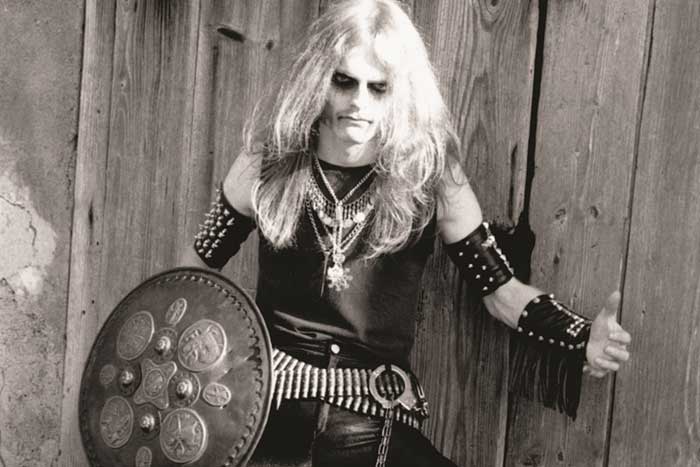
Rabid fans want to hear everything, even if the creator, like yourself, isn’t as into it. We want to judge for ourselves, and sometimes even try and defend the undefendable. It’s the wonderful thing about being a fan of something—you’re passionate.
And I’m exactly like this. I buy all the reissues and box sets, because there’s demo tracks—things that were originally deemed to be garbage in the studio many years ago, now becomes valuable. It’s fragments that are interesting to fans. I totally understand.
You’ve managed to stay so creative with Triptykon as well as the Monotheist record from the Celtic Frost reunion, but the final question is: are you defined by Celtic Frost?
I think Triptykon is quite the monumental band. We’ve had much more success than we’ve ever dared to dream. I’m blown away by how staggeringly dark and heavy that material is. But having said that, yeah, I think that my life is completely defined by Celtic Frost. Even though we were together for a rather short time, we were so manic in creating and so fearless at the time in exploring other influences, that it’s defined our musical lives. And in turn, our private lives, forever.





















